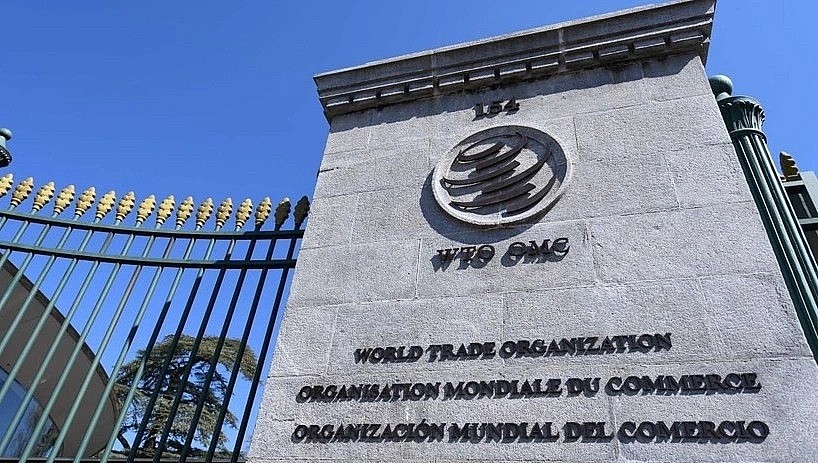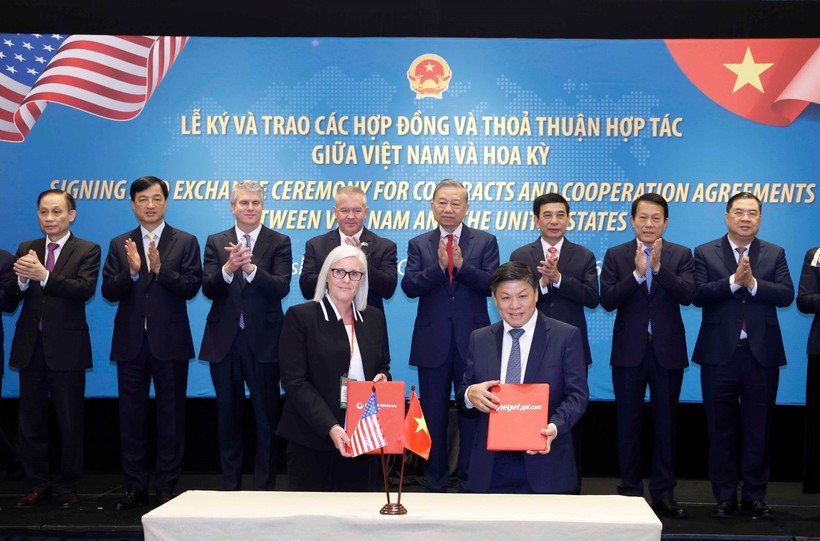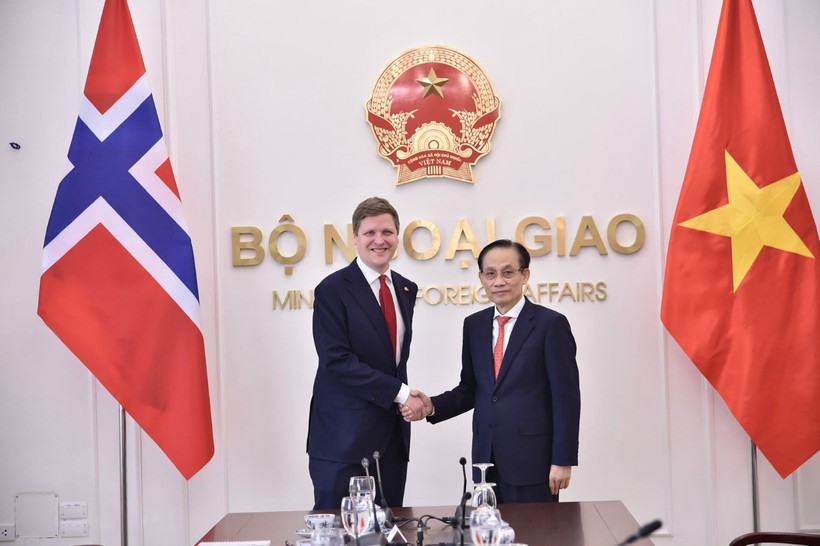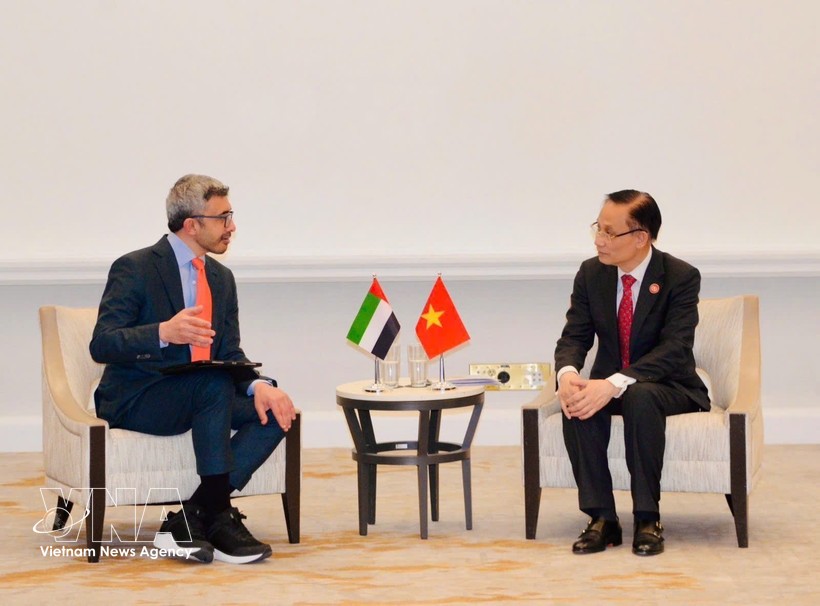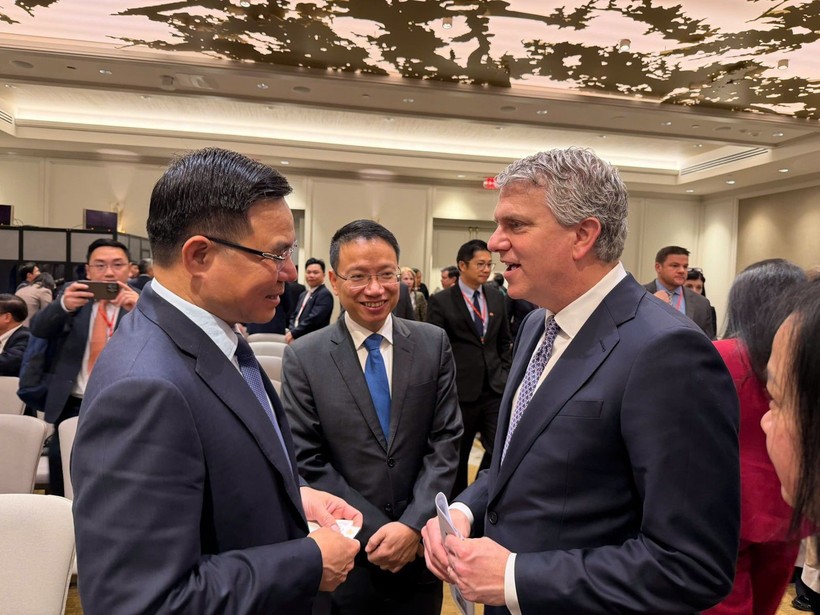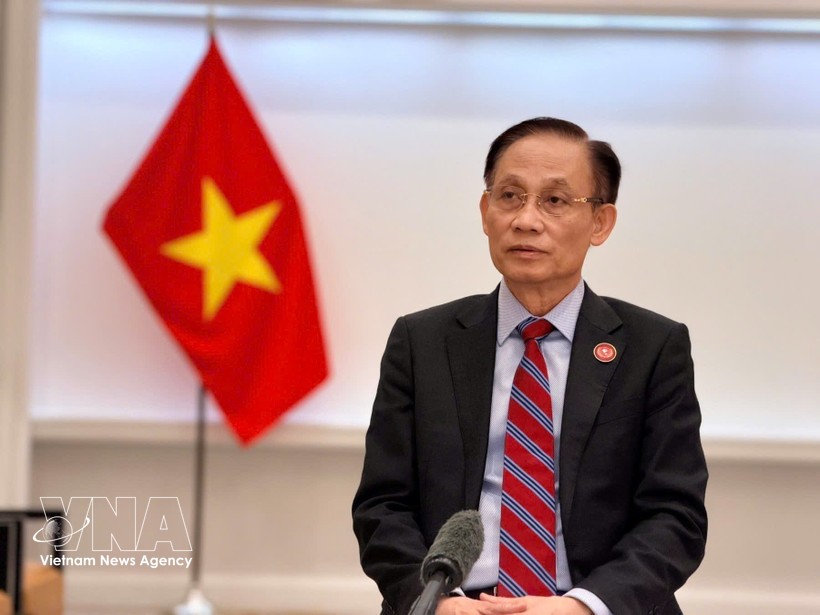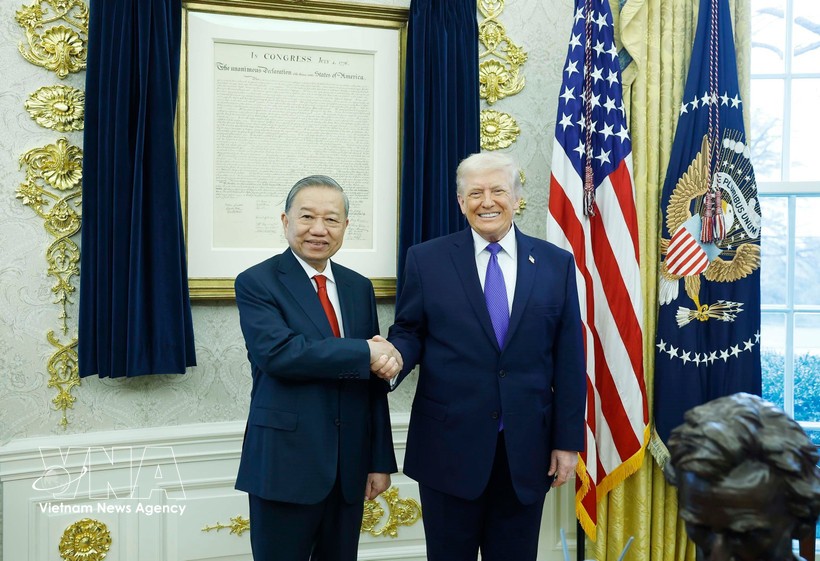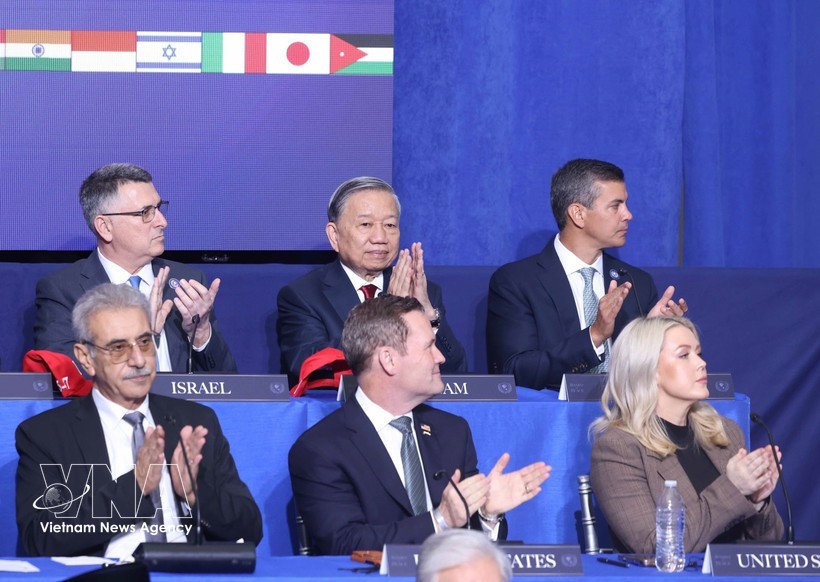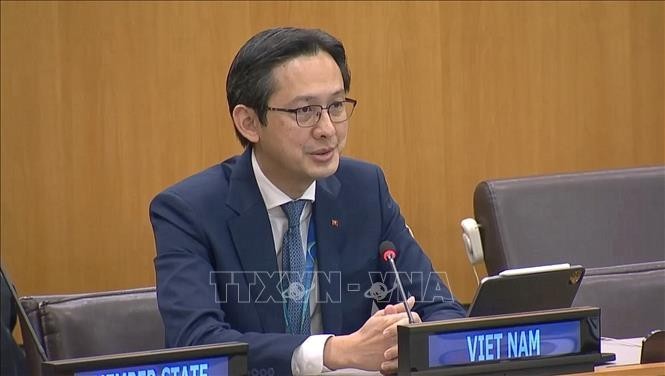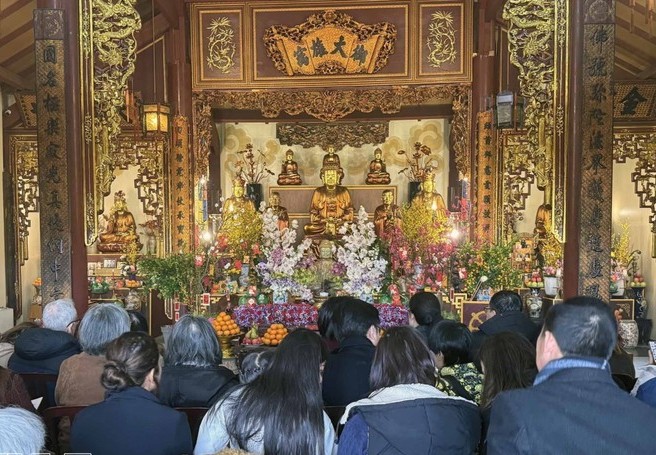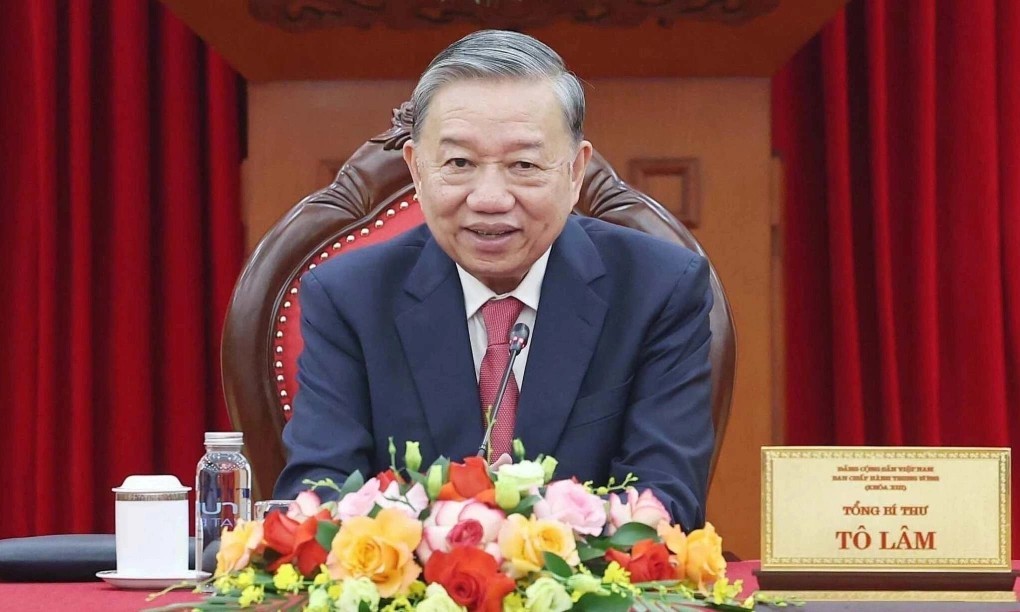Vietnam, Hungary step up parliamentary diplomacy
The upcoming official visit to Vietnam by Speaker of the Hungarian National Assembly László Kövér from October 18 – 22 not only demonstrates the mutual respect between the two nations but also reaffirms the commitment of their senior leaders to further deepen the comprehensive partnership, making bilateral ties increasingly substantive and effective.
The visit comes as the two countries celebrate the 75th anniversary of diplomatic relations (1950 – 2025) and just five months after Hungarian President Sulyok Tamas’s visit to Vietnam in May.
75 years of trusted friendship and close ties
Vietnam and Hungary officially established diplomatic relations on February 3, 1950, and elevated their ties to a comprehensive partnership in September 2018.
In recent years, political and diplomatic relations have developed strongly based on mutual trust and understanding, with regular exchanges of delegations at all levels, including those between the sides’ parties, governments, national assemblies, and localities.
The growing political trust between the two countries has provided a solid foundation for expanding cooperation in other areas, especially economy and trade. Hungary has actively supported the ratification of the EU–Vietnam Free Trade Agreement (EVFTA) and was the first EU member state to approve the EU–Vietnam Investment Protection Agreement (EVIPA).
Hungary is one of Vietnam’s potential markets in Central and Eastern Europe, while Vietnam serves as a key Asian partner and Hungary’s leading trading partner in Southeast Asia. Bilateral trade reached over 900 million USD in 2024, up 7.3% year-on-year, and 758.3 million USD in the first nine months of 2025, according to VNA.
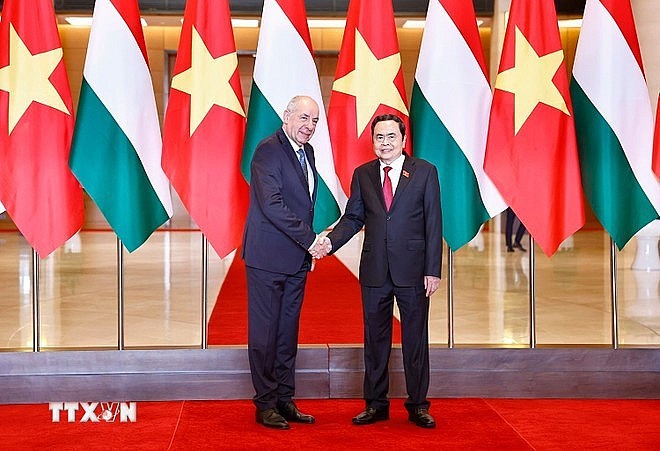 |
| On the afternoon of May 28, 2025, Vietnamese National Assembly Chairman Tran Thanh Man (R) had a meeting with Hungarian President Sulyok Tamas during the latter’s official visit to Vietnam. (Photo: VNA) |
Traditional cooperation areas such as culture, education, sports, tourism, labor, science and technology, environment, agriculture, and water management have also been actively promoted. The two countries closely coordinate and support each other at multilateral forums such as the United Nations and the Asia–Europe Meeting (ASEM).
Parliamentary cooperation increasingly strengthened
The first inter-parliamentary cooperation agreement between Vietnam and Hungary was signed in 2017 and renewed in 2022, establishing a stable legal and institutional framework for collaboration. The agreement has enabled the two sides to share legislative experience, oversight practices, and policy-making approaches, thereby enhancing mutual understanding and trust between their legislative bodies.
The National Assemblies (NAs) of Vietnam and Hungary have pledged to increase high-level and committee-level exchanges, jointly organize seminars and policy dialogues, and share experiences involving institutional improvement, rule-of-law state building, and sustainable development.
Both sides also maintain close coordination at multilateral parliamentary forums such as the Inter-Parliamentary Union (IPU) and forums in the Asia–Europe region, ensuring their legislatures’ voices are heard on major international issues and supporting each other at multilateral platforms, thereby enhancing the standing of both Vietnam and Hungary.
Deepening comprehensive partnership through parliamentary diplomacy
According to Vietnamese Ambassador to Hungary Bui Le Thai, the upcoming visit offers an opportunity for both sides to review the outcomes of bilateral cooperation and discuss comprehensive measures to enhance ties in areas ranging from politics, diplomacy, economy, trade, culture, and education to science-technology and parliamentary cooperation – a key pillar of the overall relationship.
During the visit, the two NAs are expected to engage in in-depth discussions on legislative, oversight, and policy-making practices, strengthen coordination in regional and international parliamentary forums, and foster exchanges between specialised committees and friendship parliamentary groups.
The two sides will also review the implementation of cooperation agreements, including the 2022 parliamentary deal, and define new directions suitable to current global and domestic developments, aligning with the development priorities of both countries.
Sharing this perspective, Hungarian Ambassador to Vietnam Tibor Baloghdi said the official visit reflects the shared commitment of both countries to further elevate bilateral relations through parliamentary diplomacy and closer coordination between relevant agencies. The Hungarian NA attaches great importance to enhancing ties with the Vietnamese NA, considering the ties a solid pillar of the political relationship between the two countries.
Vietnam, Japan step up cooperation in cultural industry development
Vietnam and Japan are stepping up cooperation in developing cultural industries, viewing culture as both a spiritual foundation and a strategic driver for sustainable development.
The Vietnam Federation of UNESCO Associations on October 17 held an international seminar in Tokyo on Cultural industries – a strategic driver for sustainable development.
Those in attendance at the event included Professor Yuji Suzuki, President of the National Federation of UNESCO Associations in Japan and Secretary-General of the Asia-Pacific Federation of UNESCO Clubs and Associations (AFUCA); Nguyen Le Hang, Deputy Secretary-General of the Vietnam Federation of UNESCO Associations and Deputy Editor-in-Chief of Ngay Nay magazine; along with speakers, scholars, business representatives and members of the Vietnamese community in Japan.
In her opening remarks, Nguyen Le Hang affirmed that the seminar extended a shared journey of trust and responsibility between the UNESCO Associations of Vietnam and Japan, who have long worked together to promote UNESCO’s values.
She noted that in Vietnam, the notion that “culture is the spiritual foundation of society, both the goal and the driving force of development” has been affirmed through national cultural and social strategies. The Tokyo seminar, she said, continued this spirit within the broader flow of international cooperation, reflecting the sustained efforts of the two UNESCO federations.
She added that the chosen theme “Cultural industries -a strategic driver for sustainable development”, illustrates the shared vision and harmony between the two organizations. Japan, with its advanced creative industry, and Vietnam, with its rich cultural heritage undergoing digital transformation, can learn valuable lessons from each other on preserving identity while fostering creativity and innovation.
Hang expressed her belief that, in the spirit of solidarity and international cooperation, the friendship between the Vietnam Federation of UNESCO Associations and its Japanese counterpart will continue to thrive as a model of partnership within the global UNESCO movement.
Speaking to the press, Professor Yuji Suzuki emphasized that culture, in its broadest sense, shows a way of life shaped by human behavior and thinking. From that perspective, culture is rooted in human experience and varies across regions, peoples, and religions.
He underlined that the foremost priority is the proper preservation of social and cultural heritage. While Japan and Vietnam have different historical paths, both attach great importance to valuing local communities and passing cultural traditions on to future generations.
According to him, Japan places strong emphasis on cultural education, starting from the primary level. This approach is based on the idea that national culture is the sum of local cultures rather than the elimination of regional distinctions to form a single national identity.
Suzuki stressed that the distinctive cultures of both Japan and Vietnam should be seen as shared assets of humanity. Many of their cultural heritages have been recognized by UNESCO as World Heritage sites. Enhancing awareness of Vietnamese culture and Japan’s local cultures, he said, is a highly meaningful cultural initiative, according to VOV.
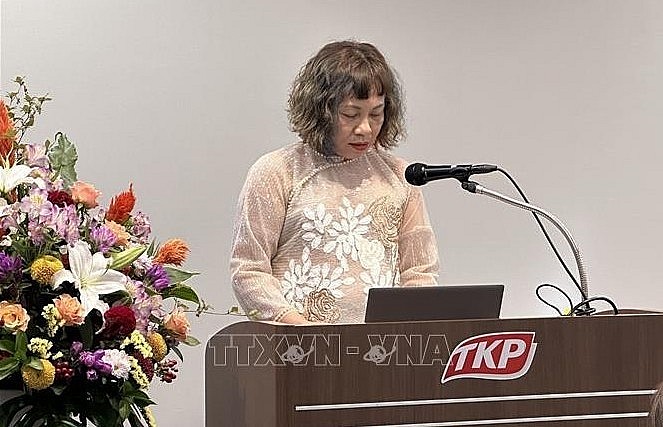 |
| Nguyen Le Hang, Deputy Secretary-General of the Vietnam Federation of UNESCO Associations and Deputy Editor-in-Chief of Ngay Nay Magazine, speaks at the seminar (Photo: VNA) |
Director Nguyen Huy Quang, representing Van Show Art Joint Stock Company, cited large-scale art productions in Vietnam over the past decade as examples of how cultural industries contribute to economic growth. Many of these shows have enjoyed lifespans of five to eight years, becoming major tourism attractions, particularly for international visitors, while spreading the value of Vietnamese cultural identity. He noted that cultural-based art performances have helped build a sustainable ecosystem that generates economic benefits for localities.
Quang expressed hope that the UNESCO federations of Vietnam and Japan will continue to support the development of cultural and performing arts industries, providing more opportunities for cultural exchange and trade promotion, as well as for learning from Japan’s success in preserving identity and promoting cultural values.
The seminar featured two discussion sessions with speakers, including directors, artists, and entrepreneurs from both countries, as well as representatives of the Vietnamese community in Japan.
The sessions were lively and substantive, generating ideas to bolster cooperation in cultural industries and share visions for future collaboration. From insightful presentations and practical experience to artistic performances and tributes to artists and artisans, the event conveyed one clear message: culture is not only a spiritual heritage but also a strategic driver for sustainable development.
Forum strengthens Vietnam – EU trade cooperation towards green, sustainable growth
Although the EU – Vietnam Free Trade Agreement (EVFTA) has elevated the economic and trade relations between the two sides to new heights, there remains vast potential for further development, requiring joint efforts from management agencies and business communities, heard a forum held in Ho Chi Minh City on October 17.
At the Vietnam – EU Economic and Trade Cooperation Forum 2025, jointly organised by the Vietnamese Ministry of Industry and Trade (MoIT), the embassies of the EU member states, and the European Chamber of Commerce in Vietnam (EuroCham), Deputy Minister of Industry and Trade Phan Thi Thang said that five years after the EVFTA took effect, the Vietnam – EU trade cooperation has maintained positive growth momentum and shown encouraging shifts, despite global economic headwinds.
According to data from Vietnam Customs, two-way trade has steadily increased, from 48.9 billion USD before the EVFTA came into force to nearly 78 billion USD in its fifth year, or an annual growth rate of over 10%. Vietnam’s exports to the EU rose by an average of 11.7% per year, while imports from the bloc grew 6.1% annually.
The EU is now Vietnam's leading trading partner, ranking as the third-largest export market and fifth-largest import market. Conversely, Vietnam is the EU's largest trading partner within ASEAN and ranks among the top 10 suppliers of goods to the EU market, reported VNA.
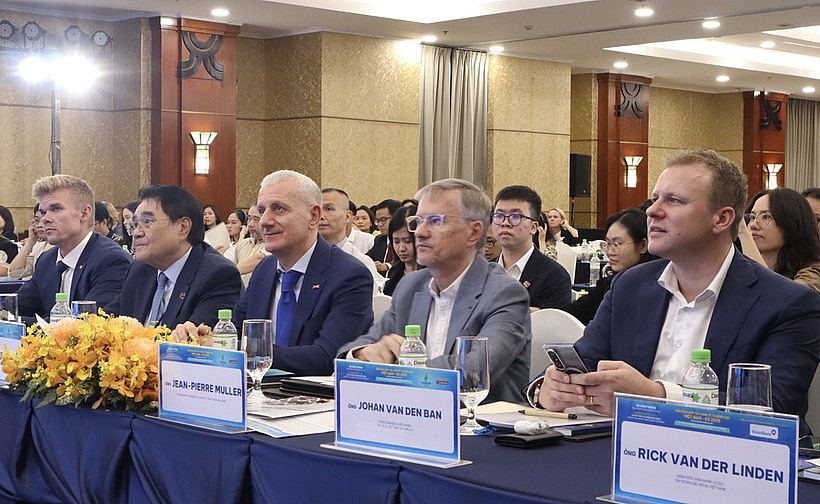 |
| Participants in the Vietnam – EU Economic and Trade Cooperation Forum 2025 in HCM City on October 17 (Photo: VNA) |
Thang affirmed that EVFTA not only promotes trade and diversify the market but also creates drivers for economic restructuring, institutional reform, and better investment environment. The agreement, she added, has opened new avenues for cooperation in priority areas such as green economy, digital economy, energy transition, and sustainable development, aligning with both the EU’s focuses and Vietnam’s socio-economic development goals.
She noted that Vietnam needs to remain agile and adaptable to fully capitalise on these opportunities amidst global uncertainties, adding the country, with a highly open economy, needs to actively integrate deeper into global value chains to strengthen its position.
EuroCham Vice Chairman Jean-Jacques Bouflet said the EU sees Vietnam as a key partner that offers significant advantages in trade diversification, investment expansion, and flexible supply chain. Vietnam, he said, is increasingly recognized as a regional hub for sustainable manufacturing and investment, thanks to its young and dynamic workforce, progressive reforms, and strong commitment to innovation and sustainability.
EuroCham’s survey revealed that 76% of EU business leaders see Vietnam as an attractive investment destination. Moreover, 80% of European firms in Vietnam expressed optimism about strong growth prospects over the next five years. These factors form a solid foundation for long-term prosperity and deeper partnership between Vietnam and the EU, according to Bouflet.
However, he acknowledged that significant challenges remain, with many EuroCham member companies reported that complex administrative procedures remain a major barrier, causing delays, generating costs, and affecting operational efficiency.
EuroCham recognizes and appreciates the Vietnamese Government's strong reform efforts in recent times, particularly the elimination of overlapping procedures, regulatory relaxation, and promotion of a more dynamic and transparent business environment.
As a long-standing partner in Vietnam’s agricultural development, CEO of De Heus Vietnam and Asia Johan Van Den Ban highlighted the rising consumer demand for product transparency, ethical sourcing, and environmental responsibility. Across Asia, food safety, animal welfare, and environmental protection are becoming key priorities. Meanwhile, European partners are adapting their procurement strategies to comply with ESG standards and new EU regulations such as the Carbon Border Adjustment Mechanism (CBAM) and the EU Deforestation Regulation (EUDR).
Against the backdrop, he pointed out that enterprises failing to adapt quickly to the green and sustainable trend risk losing their position in the global value chain, suggesting strategic coordination between the Government and businesses and international partners to promote green transition.
Storm No. 12 may hit East Sea as cold air moves into northern Vietnam
Vietnam’s East Sea could face its 12th storm of the year, while the north prepares for a strong cold surge on October 19.
A tropical depression near the East Sea is expected to strengthen into Storm No. 12 in the next one to two days. At the same time, northern Vietnam is likely to experience its first northeast monsoon of the 2025–2026 winter season on October 19.
According to the National Center for Hydro-Meteorological Forecasting, by 1:00 PM on October 17, the tropical depression was centered around 13.5°N latitude and 130.2°E longitude, over the eastern waters off central Philippines.
Maximum wind speeds near the center of the depression reached level 7 (50–61 km/h), with gusts at level 9. It is currently moving westward at a speed of 20–25 km/h.
In the next 24 hours, the system is expected to maintain its westward path and speed, potentially strengthening into a storm with wind speeds reaching level 8 and gusts at level 10. By 1:00 PM on October 18, the storm's center is forecast to be over the eastern waters off central Philippines.
During the following 24 hours, the storm will shift direction slightly northwestward, continuing at 20–25 km/h. By 1:00 PM on October 19, it is expected to be located over Luzon Island in the Philippines, maintaining wind speeds of level 8 and gusts at level 10.
From 48 to 72 hours after that, the storm is projected to continue moving mainly northwest at a similar pace, entering the East Sea and possibly gaining further strength, cited VNN.
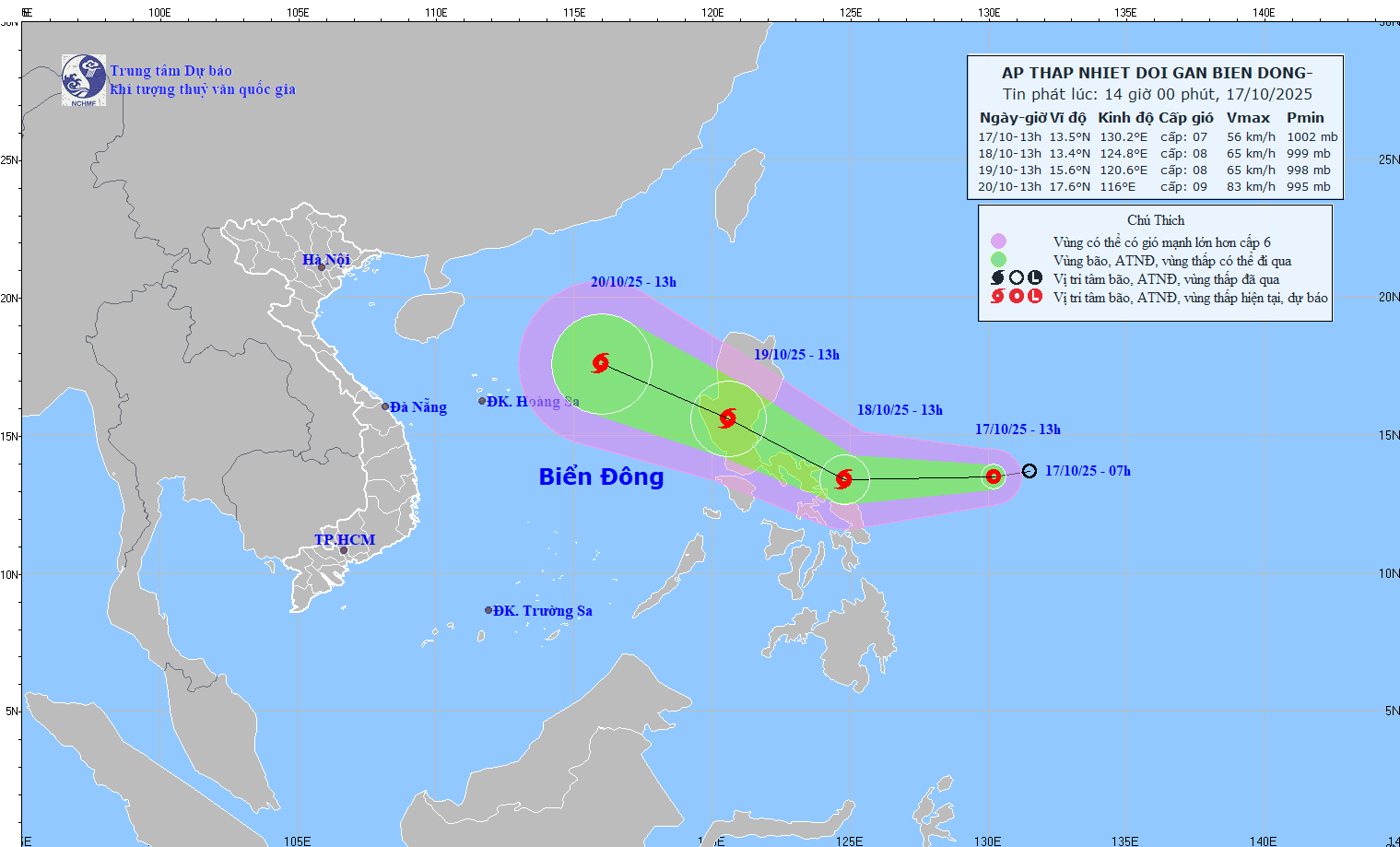 |
| Projected path of the tropical depression near the East Sea as of the afternoon of October 17. Source: NCHMF |
Experts forecast that the tropical depression will develop into a storm and enter the East Sea by the evening of October 19, becoming the 12th named storm of 2025. Coinciding with this, northern provinces are expected to experience the first northeast monsoon of the 2025–2026 winter season on October 19.
Due to the influence of the tropical depression, and its potential transformation into a storm over the East Sea, strong winds of level 6–7 are expected to gradually affect the eastern part of the northern East Sea starting October 19. Areas near the storm’s center may experience winds of level 8 with gusts up to level 10, and waves ranging from 2.5 to 4.5 meters. The sea will be very rough.
Between October 20 and 22, the northern East Sea, including the Paracel Islands, may be impacted by strong winds ranging from level 9 to 11, with gusts reaching level 14.
All vessels operating in these dangerous areas may be affected by thunderstorms, whirlwinds, high winds, and large waves.
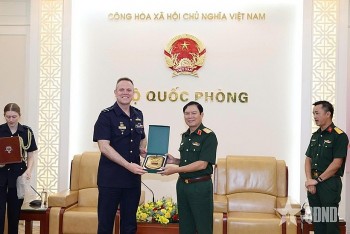 | Vietnam News Today (Oct. 14): Vietnam, Australia Seek Stronger Defense Cooperation Vietnam News Today (Oct. 14): Vietnam, Australia seek stronger defense cooperation; Vietnam, Türkiye commit to deepening ties in defense industry; Quang Ninh enhances cooperation with ... |
 | Vietnam News Today (Oct. 15): European Firms Show Strong Optimism in Vietnam Vietnam News Today (Oct. 15): HCM City to hold dialogue with US, European and Japanese businesses; Vietnam–Francophonie Economic Forum promotes partnership for shared growth; European ... |

